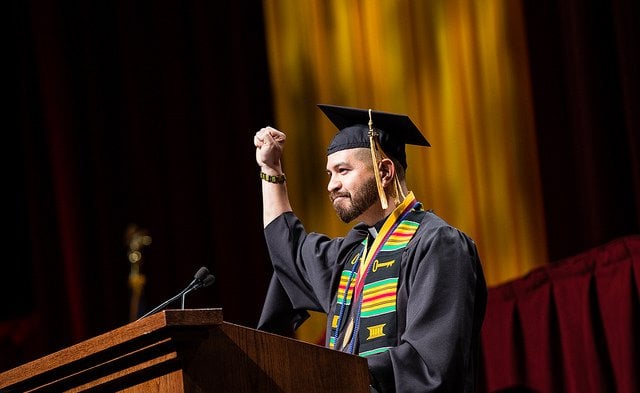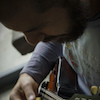Marcos Gonzales, SJ, MSW delivered the following address at Loyola University Chicago’s School of Social Work commencement last week. Marcos was selected as the student speaker for having written a speech that was representative of the values and challenges that face social workers today.
Good afternoon, President John Pelissero, Provost Patrick Boyle, Dean Susan Grossman, Loyola University Chicago School of Social Work faculty and staff, families, friends and fellow graduates.
Commencements are about beginnings, but also about remembering. I invite us to begin today by remembering the Indigenous peoples on whose land this city was built. We begin today by remembering the many waves of migrants and slaves who labored to construct it. We begin today, in reverence and gratitude, by remembering the many sacrifices which have made this commencement possible.
I would like to begin by remembering what a privilege it is to be with each of you in this place today. As a first-generation college student and the first person in my family to receive a master’s degree, it’s a privilege I don’t take lightly. My father came to this country so that I might have an opportunity like this. So, I must begin by remembering to say: ¡Muchísimas gracias mama y papa!
I remember one of my favorite childhood movies, Willy Wonka and the Chocolate Factory. Verruca Salt exclaims her disbelief in snozberries, to which Willy Wonka replies, “We are the music makers, and we are the dreamers of dreams.” There will be many Verruca Salts in our lives, many naysayers who will seek to drown out the voices of hope and imagination. We know this because we’ve already seen evidence of their presence.
We have been educated in a time of great uncertainty and unrest. We have witnessed the great influx of unaccompanied minors fleeing the violence in Central America. We have watched the Syrian Refugee Crisis unfold, and mourned the loss of the many lives taken by ISIS and Boko Haram in the Middle East, Africa and Europe. We have lived in Chicago during one of its most violent periods. Many of us began our studies here the same August that saw an awakening of our nation to the cry that Black Lives Matter. We can add these names to our list of educators: Trayvon Martin, Michael Brown, Eric Garner, Tamir Rice, Rakia Boyd, Sandra Bland, Tyshawn Lee, Laquan McDonald. We remember them because we recognize that our own liberation is inextricably linked with theirs; and we know that we will never understand how much our lives matter until we can say, without hesitation, that Black Lives Matter! And the continual loss of black and brown lives in our city, in our nation and in our world will be an indictment on us and our profession unless we as social workers take the charge to address the structural violence that plagues our communities.
As social work interns, we have worked directly with many of these communities, in schools, hospitals, detention centers, and community agencies. We are called to help bear the pain of a broken world, and in the process have our own hearts broken open – stretched to new dimensions, so that they will be big enough to meet each new day with all the compassion and love necessary to overcome these injustices. We must continue to delve deep into the many intersections of our identities and address the ways in which our privilege maintains oppressive systems.
As dreamers, we dream of a better world for those who our society has too quickly thrown away. But our work cannot simply end in memory, dreams or pure imagination. Ours is a profession of social action, whether that be in direct practice, community organizing, advocacy, policy development, education or research. As social workers, we are called to each of these roles and the privilege of this Jesuit education is not good in and of itself, but only inasmuch as we put it at the service of others. As the “music makers” and “dreamers” of our profession, we will produce research and develop programs and new interventions, seeking to fill the gaps for those who are not yet adequately being served. We will use our capacity to think creatively, jumping far outside the box to develop the next revolutionary evidence-based practices.
We have seen the direct impact that government failure has on our city and state. We cannot simply wait until our funding is threatened by state budget cuts, or wait for a mayor to decide a convenient time to release a video of police brutality. We must be proactive, calling and holding politicians and policy makers accountable to properly implement the policies that impact our clients, and work on developing ways to fix the policies that continue to oppress and marginalize. For, as Archbishop Desmond Tutu says, “if we are neutral in situations of injustice, we have chosen the side of the oppressor.”
Our education does not end here. As we leave the classroom, we are privileged to have the greatest teachers to educate us: our clients. They are the experts of their lives, and they will show us the injustices that need to be undone. Their stories must be told, and we must help create spaces of empowerment where they are able to share their voice and tell their stories. We join with theirs our voices of hope and imagination, our hands and feet of social change.
On this day of commencement, we begin by remembering that our voices will cry out for justice until justice is celebrated by all. We begin by remembering what it means to be a music maker, and what it means to be a dreamer of dreams. For today, as we walk out these doors, we go forth to be the music makers and the dreamers of dreams our world so desperately needs. Thank you, and remember Si Se Puede!
– // –
Marcos’ speech can be found at 37:00.
The cover photo of Marcos Gonzales, SJ was used with permission from Loyola University Chicago and can be found here.


